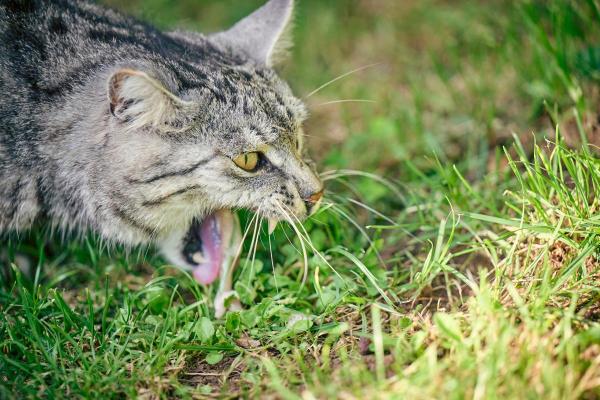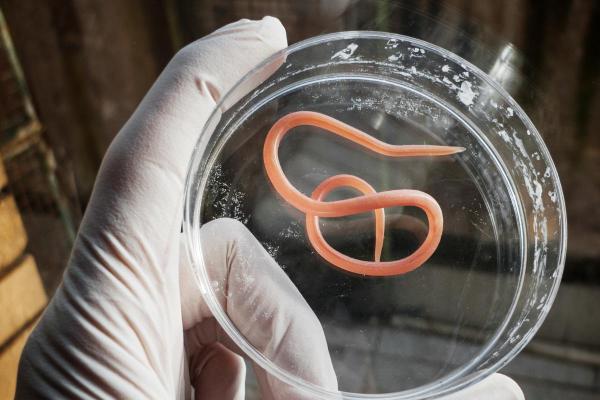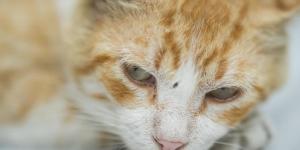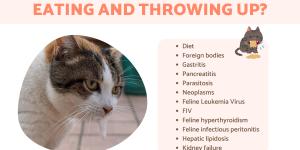My Cat Throws Up a Clear Liquid



See files for Cats
Any type of vomit in your cat is cause for concern, but guardians may be confused if their cat is throwing up water. There are many causes of throwing up a clear liquid, but if it is prolonged for more than 24 hours or is accompanied by other symptoms, it is important to seek veterinary advice. A cat throwing up a clear liquid may be due to drinking too much water, something which will resolve itself quickly. However, there are also pathological causes and other health-related factors we need to consider.
AnimalWised finds out why my cat throws up a clear liquid. We discover the causes and treatments of cats vomiting water so that you can have a better idea of what to expect after an expert diagnosis.
Drinking too much water
The domestic cat is known for not drinking a lot of water. Even if we see a cat lapping up water from their bowl for a long period of time, they may only be ingesting a few drops with every flick of the tongue. For this reason, we often have to ensure hydration by providing water fountains or using wet food with a higher water content.
During certain periods, a cat may want to drink more water than usual. Perhaps they are hot or they are recovering from an illness which made them dehydrated. In such cases, the feline may intake more water than usual. The cat may drink so much that they throw it up later. If they have an otherwise empty stomach, the vomit will be a clear liquid mostly made up of water.
There are also certain pathologies which can make a cat drink more water than usual. In these cases, throwing up water might be one of various symptoms we can observe. We look at some of these in more detail in the following sections.
What to do if a cat drinks too much water
Our concern in these cases is the reason why they drink too much water. If a cat accidentally drinks too much and vomits up a clear liquid once, we won't have any cause to worry. They should be able to limit their intake on their own. However, if they continue to do it as a symptom of an underlying health problem, it is vital we take them to a veterinarian for diagnosis. Possible causes include kidney disease or diabetes, among other serious issues.
Refuses food or medication
While individuals may differ, cats are known to be picky eaters. If something doesn't appeal to them, they won't eat it. This is one of the reasons it can be so difficult to feed them medications since they are often much less than appetizing. The act of introducing a tablet or oral suspension into their mouth can cause the animal to start salivating uncontrollably.
Since this hypersalivation can occur when feeding food they don't like or a medication, they often swallow a lot of saliva into their stomach. The distaste for what has been ingested, as well as the stress of the situation, can cause the cat to throw up. Depending on what they have previously eaten, the cat can vomit a clear liquid or clear liquid with food. They may also vomit white foam or a yellowish liquid if bile is present.
What to do if a cat refuses food or medication
If your pet tends to vomit the medication, talk to your vet to explore the possibility of administering the medication through another route. If the problem is a result of the cat not liking a certain type of food, you can either try to make it more appetizing or switch feeds.
Learn more about why a cat vomits bile with our article explaining why a cat vomits yellow liquid.
They have an empty stomach
Unlike dogs, cats do not prefer to eat a lot of food in one sitting. While some may differ, they generally prefer to eat small portions rationed into different meals throughout the day. For this reason, we should keep some food available in a bowl at all times so they can manage their own meals. This may differ depending on whether you feed them dry kibble, wet food or a homemade diet.
As a result of this habit, a cat may vomit a clear liquid if they have not had access to food for enough time. In this case, their stomach is empty. There will not be much vomit, but since there is no food, it will be transparent and either clear or a yellowish color. The latter implies the presence of bile.
What to do if a cat has an empty stomach
The treatment of this problem is easy. You will need to supply the cat with food. While not having food for a short period will not cause significant harm, if it happens for a prolonged period or with regularity, it can have seriously deleterious effects on their health. Ensure you know what is the best food to feed your cat and establish a feeding schedule to ensure their dietary needs are met.
Hairballs
Cats are very hygienic animals and will spend a large portion of their day dedicated to grooming. Due to hooked papillae on their tongue, cats can comb their own coat to ensure conditioning and maintain its health. In doing so, they will inevitably swallow small amounts of hair. This amount will be even greater in longhaired cat breeds.
As hair is ingested over time, it can accumulate inside the cat's gastrointestinal tract. When this happens, hairballs can form. Scientifically known as trichobezoars, they cannot be digested and can cause the cat to have blockages. While intestinal blockage in cats is very serious, in most cases the cat will cough up the hair before this can happen. In this case you will see the cat throws up a clear liquid, preceded or succeeded by hair.
What to do if a cat has hair balls
If your cat is prone to vomiting hairballs, there are specific foods to try to reduce their formation. We can also provide malt paste to help better ensure gastrointestinal transit and prevent blockages. We should also ensure we brush the cat according to their individual needs to remove the dead hair which can cause accumulation.
Learn more about hairball prevention with our article asking what is malt paste for cats?
Parasitosis
Feline parasitosis is relatively common, especially in the case of stray cats, cats with access to the outdoors, small kittens or cats that do not follow an adequate deworming regimen. Parasites can be external or internal, with helminths (commonly known as worms) being some of the most common types of intestinal parasites in cats. They can become ingested and enter the digestive system, but they can also be acquired from fleas or other routes.
If a cat has internal parasites such as worms, it is common to observe small whitish dots in their feces. These appear like grains of rice. There is also the possibility that the cat eliminates helminths through vomiting. In the latter case, the entire parasite is usually eliminated. We can detect it thanks to its obvious worm shape. In this case the cat vomits clear liquid which also contains the presence of parasites such as worms.
What to do if a cat has parasitosis
If your cat vomits parasites, you should go to the vet to deworm them correctly. This professional will tell you which is the best antiparasitic depending on the parasite affecting your cat. Once the infestation has been appropriately treated, they will then help you to establish a suitable deworming schedule for the cat to ensure it does not happen again.

Poisoning
Cats are very curious animals that often interact with their environment through their mouths. Despite being picky eaters, we can be surprised at the objects and material a cat is willing to ingest. They may eat plants, plastic or even chemicals. Many of these substances can cause serious harm, resulting in poisoning. This is the case with certain plants which are toxic for cats.
If a cat is experiencing poisoning, they can have various symptoms. Hypersalivation is a common sign, often appearing as if the cat throws up a clear liquid or is drooling excessively. We may see evidence of the object or substance which cas been ingested. Foreign bodies can also become lodged in their digestive tract which can trigger vomiting clear liquid.
What to do if a cat has been poisoned
Cases of poisoning in cats will vary in intensity due to factors such as the amount ingested or the level of toxicity. When they are sufficiently high, it will be considered a veterinary emergency. The cat will enter a state of shock and their organs can shut down. We need to take the cat to a veterinary clinic immediately to stabilize the animal. We also need to prevent this from happening by removing any hazardous substances or materials from their reach.

Other pathologies
The reasons for cats throwing up a clear liquid is often not serious and does not require special treatment. Despite this, it is always imperative to know the cause. Some diseases can cause occasional vomiting, even if no other symptoms appear. You will need to keep a close eye on the cat after an episode of vomiting, to check this does not occur on a recurring basis. We also need to be vigilant to ensure there are no further signs of discomfort.
Some pathologies which can result in a cat vomiting clear liquid include:
- Pancreatitis
- Gastritis
- Renal failure
- Hyperthyroidism
- Various infections
If your cat appears to be healthy, but frequently vomits clear or slimy liquid, it is worth having a veterinary checkup to ensure that it is not suffering from any illness. They will be able to achieve diagnosis and administer any necessary treatments.
This article is purely informative. AnimalWised does not have the authority to prescribe any veterinary treatment or create a diagnosis. We invite you to take your pet to the veterinarian if they are suffering from any condition or pain.
If you want to read similar articles to My Cat Throws Up a Clear Liquid, we recommend you visit our Other health problems category.






